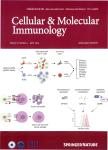The benefits of neuroinflammation for the repair of the injured central nervous system
为受伤中央神经系统的修理的 neuroinflammation 的好处作者机构:University of CalgaryCalgaryCanada The Second Affiliated Hospital of Zhengzhou UniversityZhengzhouChina
出 版 物:《Cellular & Molecular Immunology》 (中国免疫学杂志(英文版))
年 卷 期:2019年第16卷第6期
页 面:540-546页
核心收录:
基 金:The authors acknowledge operating grant support from the Canadian Institutes of Health Sciences and the Multiple Sclerosis Society of Canada(to V.W.Y.) from the National Natural Science Foundation of China(grants no:81870942,81471174,and 81520108011) Innovation Scientists and Technicians Troop Constructions Projects of Henan Province of China(for M.X.)
主 题:inflammation benefits instru
摘 要:Inflammation of the nervous system(neuroinflammation)is now recognized as a hallmark of virtually all neurological *** neuroinflammatory conditions such as multiple sclerosis,there is prominent infiltration and a long-lasting representation of various leukocyte subsets in the central nervous system(CNS)*** in classic neurodegenerative disorders,where such immense inflammatory infiltrates are absent,there is still evidence of activated CNS-intrinsic *** consequences of excessive and uncontrolled neuroinflammation are injury and death to neural elements,which manifest as a heterogeneous set of neurological ***,it is now readily acknowledged,due to instructive studies from the peripheral nervous system and a large body of CNS literature,that aspects of the neuroinflammatory response can be beneficial for CNS *** recognized benefits of inflammation to the CNS include the preservation of CNS constituents(neuroprotection),the proliferation and maturation of various neural precursor populations,axonal regeneration,and the reformation of myelin on denuded ***,we highlight the benefits of neuroinflammation in fostering CNS recovery after neural injury using examples from multiple sclerosis,traumatic spinal cord injury,stroke,and Alzheimer’s *** focus on CNS regenerative responses,such as neurogenesis,axonal regeneration,and remyelination,and discuss the mechanisms by which neuroinflammation is pro-regenerative for the ***,we highlight treatment strategies that harness the benefits of neuroinflammation for CNS regenerative responses.



